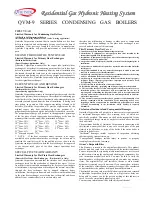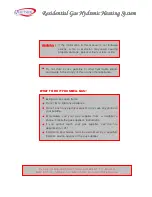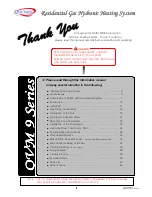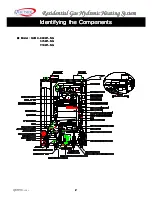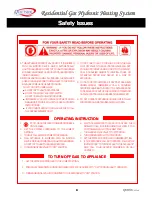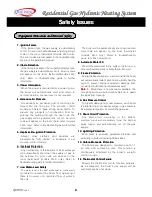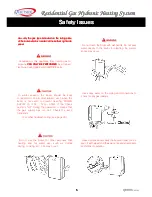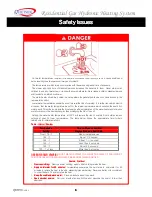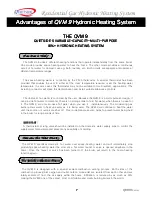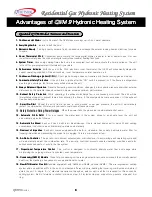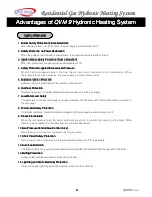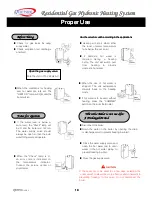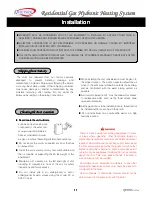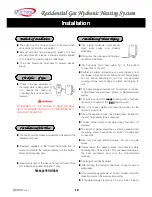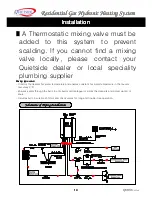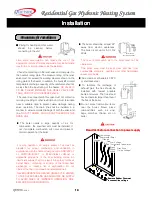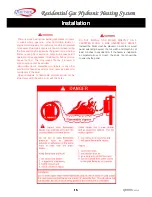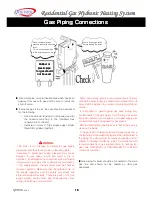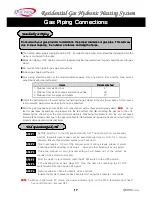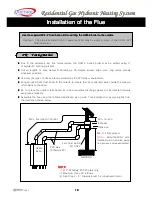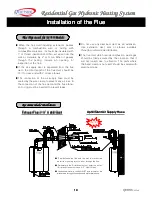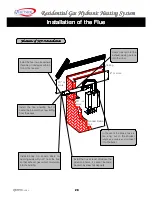
Residential Gas Hydronic Heating System
QVM 9
Series
6
6
6
6
Safety Issues
Safety Issues
Safety Issues
Safety Issues
Hot water temperatures required for automatic dishwasher and laundry use can cause scalds and
burns resulting in serious personal injury and/or death.
The temperature at which injury occurs varies with the person's age and time of exposure.
The slower response time of disabled persons increases the hazards to them. Never allow small
children to use a hot water tap, or to draw their own bath water. Never leave a child or disabled person
unattended in a bathtub or shower.
The water heater should be located in an area where the general public does not have access to the
temperature control.
Lower water temperatures should be used to avoid the risk of scalding. It is further recommended, in
all cases, that the water temperature be set for the lowest temperature which satisfies the user's hot
water needs. This will also provide the most energy efficient operation of the water heater and minimize
scale formation in the heat exchanger, thus prolonging the life of the unit.
Setting the water heater temperature at 120
°
F will reduce the risk of scalds. Some states require
settings at specific lower temperatures. The table below shows the approximate time-to-burn
relationship for normal adult skin.
Table-
Table-
Table-
Table- Risk of Scalds
Risk of Scalds
Risk of Scalds
Risk of Scalds
USE ANTI-SCALD
USE ANTI-SCALD
USE ANTI-SCALD
USE ANTI-SCALD VALVE(S)
VALVE(S)
VALVE(S)
VALVE(S) IN HOT WATER SYSTEM TO REDUCE THE RISKS OF SCALDING AT
POINTS OF USE SUCH AS LAVATORIES, SINKS AND BATHING FACILITIES.
Scalds
Scalds
Scalds
Scalds
–
First Aid
First Aid
First Aid
First Aid
1.
Remove clothing
Remove clothing
Remove clothing
Remove clothing;;;;
Remove all wet clothing, quickly. Wet clothing retains the heat.
2.
Apply cold water for 30 minutes
Apply cold water for 30 minutes
Apply cold water for 30 minutes
Apply cold water for 30 minutes;;;;
Immediately submerge the burnt area in cold water for 30
minutes to reduce the heat in the skin, preventing deeper burning. Never use butter, oils or ointment
to cover the burn. They may retain the heat.
3.
Keep the scalded person warm
Keep the scalded person warm
Keep the scalded person warm
Keep the scalded person warm;
;
;
;
Place a blanket around the person.
4. Seek medical advice
Seek medical advice
Seek medical advice
Seek medical advice;;;;
Call your medical advice hotline and describe the scald, follow their
directions.
Temperature
Temperature
Temperature
Temperature
Setting
Setting
Setting
Setting
Time to Produce 2nd 3rd
Time to Produce 2nd 3rd
Time to Produce 2nd 3rd
Time to Produce 2nd 3rd
Degree Burns on Adult Skin
Degree Burns on Adult Skin
Degree Burns on Adult Skin
Degree Burns on Adult Skin
Over 170
℉
Nearly instantaneous
160
℉
About 1/2 second
150
℉
About 1-
1/2
second
140
℉
Less than 5 seconds
130
℉
About 30 seconds
120
℉
of less
More than 5 minutes


